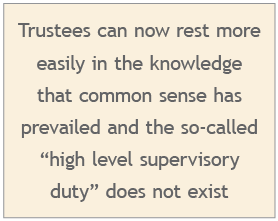Offshore trusts are used for a variety of different purposes relating to both private wealth and commercial transactions. They depend largely upon the existence of professional trustees able and willing to take on the business of being a trustee. In the modern world that does not simply involve the occasional glass of sherry with Lord Crawley to discuss the landed estates, and lunch in the City with the stockbroker to be reassured that the other trust investments were suitably diversified. The role of a modern trustee is much more nuanced and may involve being part of a more complex structure often involving one or more of the following: private trust companies, purpose trusts, reserved powers, non-diversified investments and complex financial instruments.
Against this background there are two important features of a modern trust deed which trustees pay particular attention: the so-called “anti-Bartlett” clause and the “trustee exoneration and indemnity clause”. Two recent cases, one from England and one from Hong Kong, will therefore be of particular interest to professional trustees.
Zhang & Ji v DBS Bank
The most significant decision is the judgment of the Hong Kong Court of Final Appeal in Zhang & Ji v DBS Bank [2019] HKCFA 45 delivered on November 22, 2019 which reversed the decisions of the First Instance Judge and the Court of Appeal.
DBS were the trustees of a Jersey trust settled by Zhang and Madam Ji who were the beneficiaries together with their minor sons. The trust held the sole share in a BVI company used as a private investment company, and for Ji was the company’s investment adviser. There was a Letter of Wishes directing the trustee to consult Ji with regards all matters and her recommendation should be final. The director of the BVI company also granted Ji authority to give instructions on behalf of the company. The trust contained typical anti-Bartlett provisions in a comprehensive form. Ji had caused the company to invest in certain high-risk currency-linked notes. Given the overall structure and the anti-Bartlett clause the trustee would not have been expected to be held liable for the losses suffered to the trust from the failure of the risky investments carried out by Ji. However, both at first instance and in the Court of Appeal it was held that notwithstanding the arrangements and terms of the trust deed, the trustee retained a “high level supervisory duty” which it had breached.

Upholding anti-Bartlett provisions
Fortunately for DBS and for trustees generally, the Court of Final Appeal unhesitatingly rejected the reasoning of the courts below, which it said was plainly inconsistent with the express terms of the anti-Bartlett provision.
The trust also contained typical exculpatory and indemnity provisions relieving trustees of liability short of fraud, wilful misconduct or gross negligence. The Court held that even if there had been any supervisory duty, there was simply no basis at all for concluding that there was negligence to a “serious and flagrant degree” so that the trustees would have been protected in any event.
Trustees can now rest more easily in the knowledge that common sense has prevailed and the so-called “high level supervisory duty” does not exist. Anti-Bartlett clauses are to be construed according to their terms and mean what they say.
Sofer v SwissIndependent Trustees
Another victory for trustees was achieved in England in Sofer v SwissIndependent Trustees SA [2019] EWHC 2071 where HHJ Paul Mathews sitting as a Judge of the High Court held that a fraudulent or dishonest breach of trust for the purposes of a trustee exoneration clause required that a trustee, both:
- committed a deliberate breach of trust, and
- either (a) knew, or was recklessly indifferent as to whether, it was contrary to the interests of the beneficiaries, or (b) believed it to be in the interests of the beneficiaries, but so unreasonably that no reasonable professional trustee could have so believed.
Finally, it should be mentioned that with effect from June 14, 2019, the Cayman Islands Trusts law was amended to add a new section, 64A, to give statutory jurisdiction to the Court to retrospectively correct a mistake made by a trustee by setting aside the exercise of a fiduciary power and making consequential orders. This removes any doubt that the decision of the English Supreme Court in Pitt v Holt [2013] UKSC 26 has no relevance in the Cayman Islands.
These are welcome developments for professional trustees.
![]()
T: (852) 2842 9553
M: (852) 6469 3359
F: (852) 2845 9268


